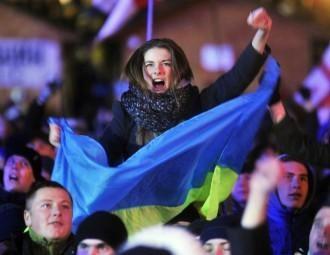Zinaida Bandarenka: Ukrainians set an example of how we must fight for freedom and truth

Russia’s bragging and imperial manners have long ago weakened brotherly relations between the Slavic peoples. And Russian military aggression in Ukraine makes these relations even more abstract.
Belarusans are very cautious about the war in Crimea: what can guarantee that Moscow doesn’t attack our country, where most people are Russian-speaking?
What influence did military aggression exert on Belarus-Russia relations? What happened with the Slavic unity and fraternity?
It is hard to talk about war on the International Women's Day. However, People’s Artist of Belarus Zinaida Bandarenka doesn’t celebrate this day, but keeps a close watch on the situation in Ukraine. She shared her opinion on the topic with the EuroBelarus Information Service.
- What is your attitude to the war in Crimea, referred to as “a defence of the Russian-speaking population” by Russia?
- We have two Ukrainian TV-channels at home which are working non-stop. It is painful to see how brave people are fighting for their freedom, but it is good example for us, Belarusans, who lack courage and self-discipline to get the right to be taken in consideration, “to be called the people”.
All our family support Ukrainian people and Maidan! Ukrainians deserve better life. I’m praying for Ukraine.
-Russia has launched a war on Ukraine, and destroyed the myth about Slavic fraternity and unity on its own. Will the relations between Russians and Ukrainians, Russian-speaking Ukrainians and Russians change after the Russian military intervention into the foreign country change?
- They will. It seems to me that these Slavic relations have been disrupted long ago: Russia’s bragging and imperial manners are rooted in their national character long since. The Slavic relations are broken, and they will hardly be restored.
- After the Crimean aggression the only fact that there are Russian-speaking people among the population of any country (whether it is Ukraine, Belarus, Germany or Poland) can serve as an excuse for the intervention. The vast majority of Belarusans speak Russian, which means that Belarus can be attacked by Russia at any point of time. Will the Ukrainian events change the attitude of Belarusans to Russia?
- I have a feeling that they will. This tendency is already seen in the statements made by some officials. Belarusan Foreign Minister Uladzimir Makei even said that Belarus sees Ukraine as an independent united country – this is the only way to develop relations between the two states.
However, Belarusans are still afraid to voice their thoughts, afraid to lose everything they gained during the last 20 years, afraid of the authorities’ reaction to their views. Narrow-mindedness of our people also prevents our people from voicing their attitude to the imperial Russia.
- What are your wishes to the Ukrainian people during these hard times?
- Only victory! To be strong till the end; Ukraine has now reached the point of no-return. The whole world, except some part of Russians, supports Ukraine.
Ukrainians set an example of how Belarusans must fight for freedom and truth.
Being a member of the Rada of Belarusan Intelligentsia I stand for Ukrainian people and for Maidan. The Rada of Belarusan Intelligentsia adopted an appeal in support of Maidan. I want to tell Ukrainians: hold on and the victory will be yours!
-
03.01
-
07.10
-
22.09
-
17.08
-
12.08
-
30.09










































